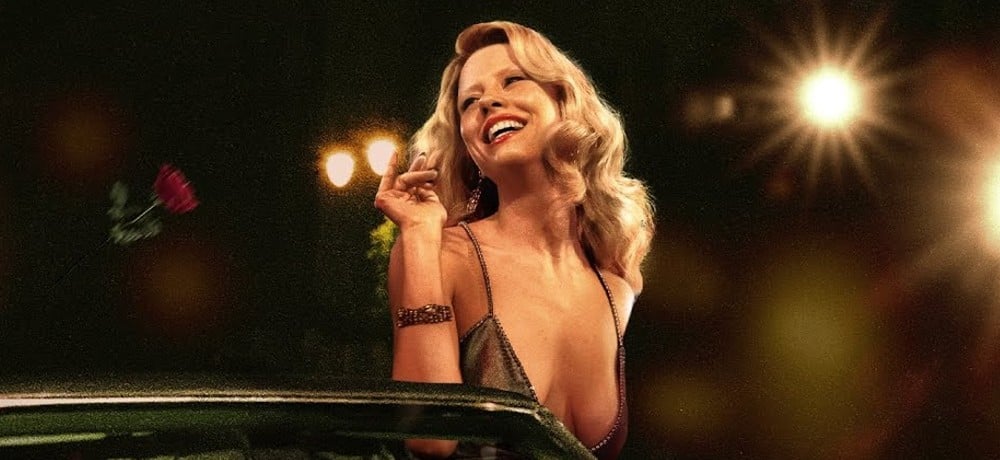


Ti West's pulpy 1980s sequel Maxxxine lets Mia Goth be a fucking star. The third film in West’s X trilogy is a sinful sendup to Regan-era Satanic Panic protests against Hollywood, aligning Maxine Minx’s Tinsletown escapades with the Night Stalker’s crime spree. Influences from Italian giallos to Jack Shoulder’s Los Angeles setups create an A+ aesthetic, the same as VHS-era “Video Nasties” paranoia, but adversely, certain themes are never fully incorporated. Maxxxine strikes its poses, cracks some skulls, and gets unexpectedly goofy, yet its pastiche sometimes feels skin-deep. West tries to have it all between Maxine’s crescendo, knife-to-throat depravity, and filmmaking commentaries, only to undersell competing features due to overstuffed ambitions.
The year is 1985. Women are being slaughtered in Los Angeles by a serial killer at large, and Maxine Minx couldn’t care less. She’s focused on one goal: graduate from adult pictures to Hollywood stardom. Maxine’s a survivor, escaping what’s dubbed “The Texas Porn Star Massacre,” but the past has a nasty way of catching up with people. In this case, Maxine encounters Louisiana private eye John Labat (Kevin Bacon laying thick cajun drawl), who digs up skeletons buried in the Lone Star State. Maxine refuses to let Labat’s advances sabotage her first leading role, starring in director Elizabeth Bender’s (stoic queen Elizabeth Debicki) prestige horror sequel, The Puritan II. How? The only way Maxine knows how — by any means necessary.
West’s Los Angeles “sleaze noir’ is a seedy haven for murder, treachery, and broken dreams. At first glance, it’s giving Brian De Palma, Dario Argento, and Nicolas Winding Refn; Los Angeles is burning behind VHS static that recreates the experience of watching outdated tubular televisions. An unnamed criminal with squeaky black leather gloves slices victims open in West’s horror-forward scenes, while procedural true crime inspirations — Michelle Monaghan and Bobby Cannavale play persistent detectives — chase a dangerous whodunit. It’s West doing Once Upon a Time in Hollywood by way of Deep Red, but also daffily unserious at parts, which can become a tonal mishmash.
Maxxxine is pulled in too many thematic directions, trying to wrap a young starlet’s evolution from zero to hero, while also encapsulating 1980s Los Angeles’ lawless Wild West period. There are details that remain vivid, like Maxine evading John by sprinting into the backlot Psycho house, or pentacles seared into dead flesh — but also an overall glitzy shallowness. Giallo notes are muted, horror fierceness takes a backseat, and the dopey B-movie sheen that promotes illicit entertainment reads like caricature exaggerations. Where X had me on the edge of my seat, enraptured by tension, Maxxxine struggles with momentum. West never quite delivers a soup-to-nuts slasher, or fulfilling Night Stalker caper, lost in Maxine’s ascension to a detriment.
That said, Goth is a scene-stealer as Maxine Minx. West’s handling of Maxine’s final act (for now) sees through emotional payoffs that began way back in X. Maxine’s no longer on the outside looking in — we witness the lengths she’ll go to stay among Hollywood’s inner sanctum. She’s also a survivor rebuilding her life after immense trauma, which is illustrated in a variety of ultra-violent and harmful ways. Maxxxine follows a Final Girl after she’s already survived one ordeal, and West’s script digs into the psychological implications that linger well after crime scenes are scrubbed away. Goth’s excellent brand of dominating confidence and raw sexual allure gets a layer of warpaint as Maxine not only fights for herself, but learns to fight for other female colleagues. West’s an admirable completionist, ensuring his muse Mia Goth has everything she needs to successfully portray a more complex Maxine Minx.
It’s complicated, because I enjoyed plenty about Maxxxine. Any movie that mashes testicles as the first noteworthy gore beat earns extra points, and while slasher violence is scarcer, you’ll clock a few graphic deathblows that show off juicy practical effects. Supporting performers hold their own against Goth, be they Giancarlo Esposito as Maxine’s loyal Z-List talent agent or Cannavale as the wannabe actor who joins the LAPD. Cinematographer Eliot Rockett captures 1980s Los Angeles in its underbelly glory with a picturesque proficiency he’s shown all franchise long, while composer Tyler Bates nails the synth-beat night fever vibes as his score boogies hardcore. I’m impressed by a good amount of what’s flaunted on screen, but also cannot ignore how storytelling tangents feel at war with one another.
Maxxxine fails to overthrow X as my favorite of West’s star killer franchise, but that doesn’t mean it’s a failure. Goth is worth the price of admission as Maxine Minx fights tooth and nail for the marquee lifestyle she tells the universe she deserves. West’s middle-of-the-road blend between Los Angeles exploitation and gruesome slasher dread falls out of synch at times, but his cocaine-fueled vision of 1980s Hollywood sucks you into each scene. There’s something so addictive about the film’s deviant on-set playground, and while everything may be a bit batty for its good, you can’t deny the radiant star power of Mia Goth as Maxine Minx.
Movie Score: 3.5/5